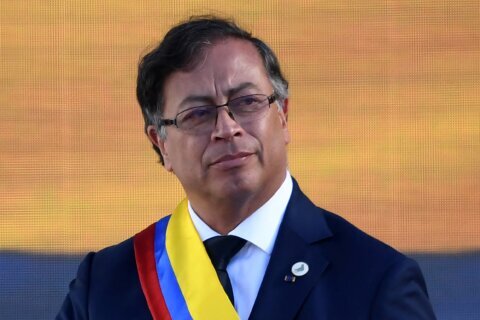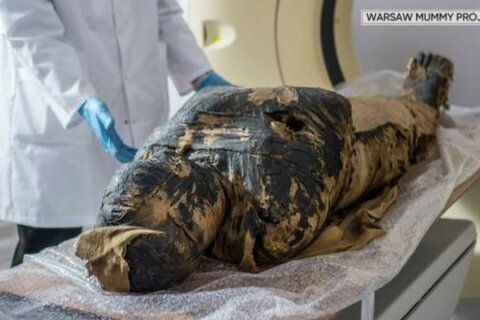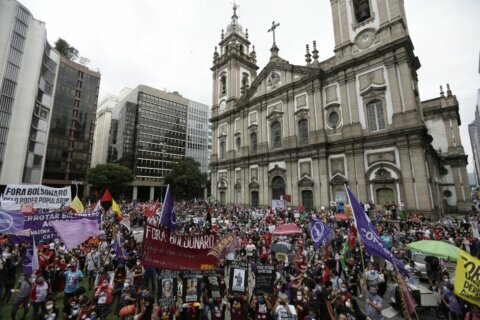Venezuela’s embattled president and his opposition rival held dueling rallies in the capital Caracas Saturday as the country struggled with an ongoing massive power outage.
Swathes of Venezuela remained without power after electricity was lost in 70% of the country Thursday and officials warned that health care was being put at risk.
Addressing supporters Saturday, President Nicolas Maduro blamed the US for the blackout, saying the grid had been sabotaged, while the US has attributed the outage to the Maduro regime’s “incompetence.”
Guaido calls for more protests
In a defiant speech in another part of Caracas, Venezuela’s self-declared interim president, Juan Guaido, assured followers that all options were on the table to get Maduro out of office.
Using a megaphone and standing atop a bridge — after police dismantled the stage he was supposed to use — Guaido said constitutional options to promote regime change would only work if the opposition continued to protest regularly and called on citizens to travel to Caracas to protest.
Guaido also said that Article 187 of the Venezuelan Constitution is under consideration and will be activated “at the appropriate moment.” Article 187 states that the National Assembly has the power to authorize the use of Venezuela military missions abroad or to allow foreign missions in the country.
He asked his supporters to remain strong in the face of the power outage.
“We have been reporting the electrical crisis for years, and now, we have to alert in a responsible manner that this could also become the gasoline crisis, in addition to the water crisis we already have.”
Maduro warns against encouraging US intervention
Meantime, Maduro insisted that the country’s power grid had been “hacked” and “sabotaged.” Maduro told supporters that almost 70% of power had been restored in the country Friday afternoon, but that progress was put off-track by an “international cyber-attack” carried out by the “US government” and Venezuela’s opposition.
Maduro announced changes inside Corpoelec, Venezuela’s National Electric Company. The first step, he said, was to “clean” the company to get rid of “traitors” and “infiltrators.”
Maduro also criticized opposition calls for a military intervention in Venezuela saying that if the US decided to carry military actions in the country, both pro-opposition and pro-government groups will be affected.
On Thursday, US Secretary of State Mike Pompeo had rejected Maduro’s finger-pointing, blaming him for the situation.
“The power outage and the devastation hurting ordinary Venezuelans is not because of the USA. It’s not because of Colombia. It’s not Ecuador or Brazil, Europe or anywhere else. Power shortages and starvation are the result of the Maduro regime’s incompetence,” Pompeo tweeted.
On Saturday, Pompeo posted a photo of Guaido’s rally with the caption: “The people of #Venezuela have again responded to @jguaido’s call to take to the streets in support of freedom and democracy. Public-sector workers, suffering economic & political repression, now stand with Guaido and the promise of a better future for Venezuela.”
Massive power outage continues
Rampant inflation and food scarcity have gripped Venezuela under Maduro, and thousands have fled to neighboring countries as shortages, political turmoil and crime rates have soared.
Blackouts have become a daily occurrence as the economic crisis has worsened, but one of the magnitude of this weekend’s — which has paralyzed most of the country — is rare.
From Caracas, CNN’s Patrick Oppmann reported that electricity returned in some areas of the city on Friday but by Saturday afternoon the entire city was without power.
“From the 26th floor of a building in Caracas there was nothing visible but a sea of blackness on Saturday. Except for a few pinpricks of light from the lucky few with generators, Venezuela’s capital and home to five million people remained in the dark,” Oppmann said.
“Every so often the occasional gunshot would ring out in the night. There was a run on gas and food and water and a growing sense that the Venezuelan government is unable to restore power to its citizens,” he said.
Blackout threatens health care
Earlier Saturday, officials warned that the situation was growing critical for dialysis patients unable to get treatment in hospitals due to the power outage.
Patients were at risk of heart attacks because dialysis was not accessible in the states of Tachira and Zulia and in Barquisimeto city, Francisco Valencia from the health watchdog group CODEVIDA told CNN’s Claudia Dominguez.
The Governor of Tachira said on Twitter late Friday that there was an “imminent risk to life” for some 160 dialysis patients and called for the border between Venezuela and neighboring Colombia to be reopened.
“…More than 160 renal patients today had their dialysis suspended, imminent risk situation to the right to life, with the border closed it prevents the possibility of maintaining them, fundamental reason to OPEN THE BORDER IMMEDIATELY!!!” tweeted Gov. Laidy Gomez.
Mauro Zambrano, representative of the hospitals and clinics union of Caracas, told CNN Friday that there had been four deaths at hospitals after power failures. CNN has not independently verified any of the four deaths.







